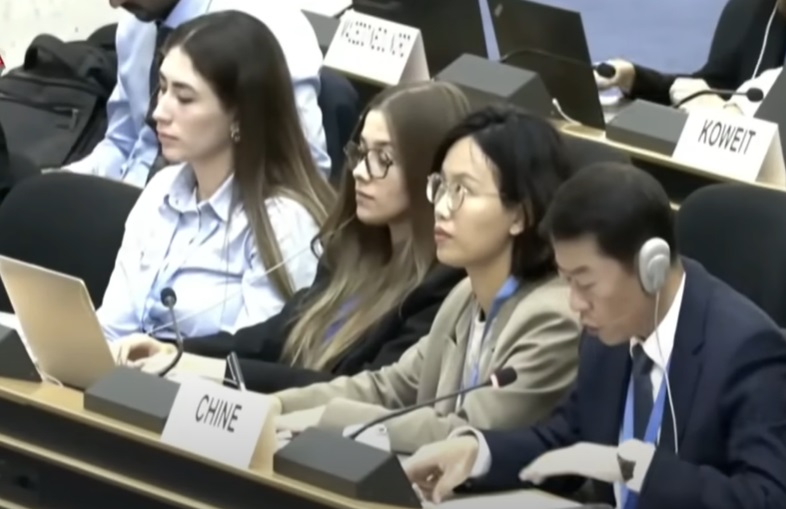-By LeN Diplomatic Correspondent

(Lanka-e-News -09.Sep.2025, 11.30 PM) -Geneva and Colombo - At the United Nations Human Rights Council in Geneva this week, China issued a pointed reminder to the international community: Sri Lanka’s future, including its approach to human rights, is for Sri Lankans themselves to decide.
The remarks, delivered by Beijing’s representative during the Council’s 60th Session, were framed as a defence of sovereignty but landed with the weight of geopolitics. For China, Sri Lanka is no ordinary island nation struggling with debt, post-war accountability, and democratic reform. It is a strategic partner perched at the heart of the Indian Ocean, a testing ground for Beijing’s Belt and Road Initiative, and a theatre in which China routinely pushes back against what it views as Western overreach.
“China urges relevant countries to respect the Sri Lankan people's own choice of the human rights development path, abandon intervention in internal affairs and political pressure, and return to the right track of dialogue and cooperation,” the delegate declared in Geneva.
The message, both blunt and diplomatic, left little doubt that Beijing regards the Sri Lankan question as yet another front in the global contest over values, influence, and sovereignty.
Sri Lanka has long been a recurring subject at the Human Rights Council. Since the end of its civil war in 2009, the Council has wrestled with the legacy of alleged atrocities committed by both the government and the Tamil Tigers, the lingering failures of reconciliation, and the state’s uneven record on justice.
Western nations, led by the United States, Britain, Canada, and members of the European Union, have consistently pressed Colombo to deliver on accountability. Resolutions have demanded independent investigations, greater cooperation with the Office of the High Commissioner for Human Rights (OHCHR), and safeguards for civil society.
Successive Sri Lankan governments, however, have alternated between grudging cooperation and outright defiance, depending on the balance of domestic politics and international leverage.
China’s intervention this week was not unusual, but the timing was conspicuous. It came as Sri Lanka’s current administration, under President Anura Kumara Dissanayake, seeks to prove it is charting a fresh course.
China’s representative went beyond platitudes. The statement praised Sri Lanka’s recent initiatives — the Clean Sri Lanka Project, new anti-corruption frameworks, the establishment of an independent prosecutor’s office, and steps toward accountability for emblematic cases such as the 2019 Easter Sunday bombings.
The list was selective and, critics argue, exaggerated. Yet by highlighting these reforms, Beijing sought to present Colombo as a government taking tangible steps while insisting that such progress must be judged on its own terms.
China reiterated its opposition to the “politicisation and instrumentalisation of human rights” and emphasised the need for dialogue rather than punitive measures. The subtext was clear: Western pressure, including sanctions or threats of aid withdrawal, only destabilises fragile societies.
Behind the diplomatic phrasing, Beijing’s message was unmistakable: external actors should resist turning Sri Lanka into a geopolitical pawn.
The defence of Sri Lanka cannot be divorced from economics. China is Colombo’s largest bilateral creditor, accounting for roughly $7 billion in loans. It was Beijing that agreed to restructure a significant portion of that debt, easing pressure on the island and enabling a $3 billion IMF bailout to proceed. Without China’s nod, Sri Lanka might have languished like Lebanon, locked out of financial lifelines.
Beyond loans, China’s pandemic-era diplomacy is still remembered in Colombo. Beijing supplied Sinopharm vaccines free of charge at a time when Western nations were accused of hoarding doses. For the Rajapaksas, then in power, those deliveries were both a health lifeline and a political shield.
For Sri Lanka, China’s words at the UN provide both cover and caution. The island is still emerging from its worst economic crisis since independence, triggered by debt mismanagement, collapsing reserves, and political turmoil that toppled President Gotabaya Rajapaksa in 2022.
The current government has pledged reforms, but the recovery is fragile. Inflation has receded, but growth is anaemic, unemployment remains high, and public frustration over austerity is simmering.
Amid this turbulence, human rights debates may feel secondary to many Sri Lankans. Yet the calls from Geneva echo domestically: victims of war crimes, families of the disappeared, and campaigners for judicial independence all argue that economic revival without justice will entrench impunity.
The Sri Lankan government, as ever, walks a tightrope. It welcomes China’s defence but cannot afford to alienate Western donors, who remain vital for trade, investment, and IMF support. India, too, looms large, with its own historical, cultural, and security interests in the island.
President Dissanayake has spoken of a “non-aligned foreign policy for the 21st century,” echoing Sri Lanka’s Cold War tradition. In practice, it means playing all sides — accepting Chinese debt relief, Indian emergency credit lines, and Western aid packages, while resisting becoming beholden to any one bloc.
But sceptics argue that in practice, such balancing often translates into paralysis: promises made to all, delivered to none.
-By LeN Diplomatic Correspondent
---------------------------
by (2025-09-09 18:36:22)
Leave a Reply